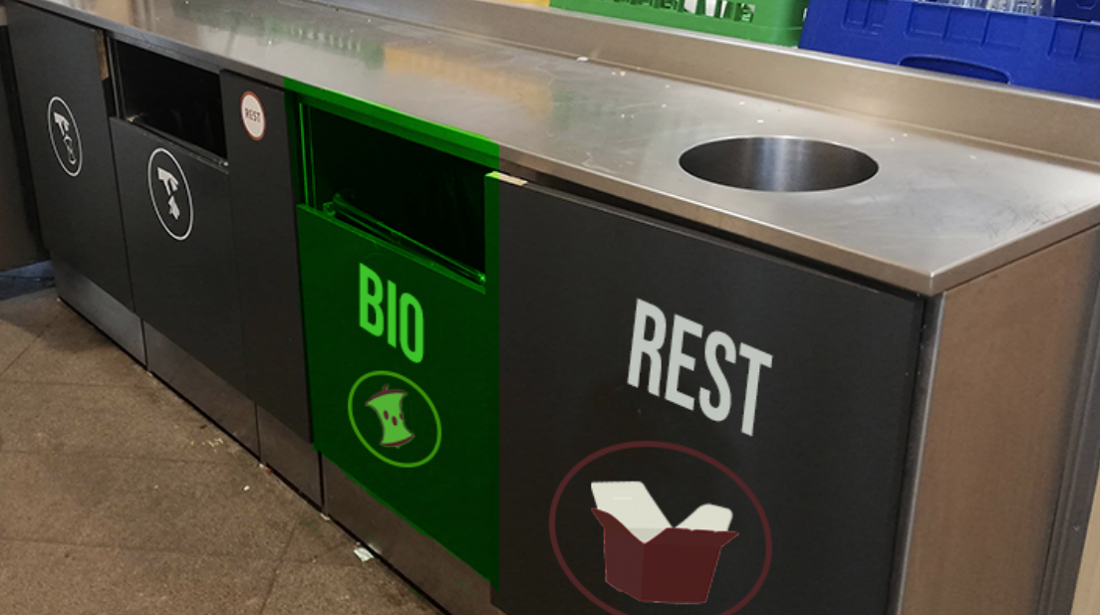Creative Recycling during the Corona Pandemic
In January, Green Campus offered a case assignment on how to achieve better waste sorting at The Maersk Tower. A group of rhetoric students took on the challenge. Shortly after, the COVID-19 pandemic put Den-mark into lockdown. However, the group did not give up and ended up with a very interesting and useful result, though the journey was very different from expected.

On Wednesday the 4th of March, a group of rhetoric students had what should have been their introductory tour of The Maersk Tower and Panum. As a part of their Master's degree course in "Rhetorical innovation and Consultancy", they were given the task of examining the existing waste management system at The Maersk Tower and propose solutions for achieving better waste sorting, primarily in the canteen area. A week later, Denmark went into lockdown and the group's access to The Maersk Tower and the users of the building suddenly disappeared.
"We had expected that our project would offer concrete material solutions to the problem, such as an information board that could be put up in the canteen. We thought we would be able to test prototypes and develop a concept in cooperation with the users," says Nikolaj Falkenberg-Klok. "When we suddenly couldn't get into the canteen, we had to rethink our project. We found ourselves making illustrations in Photoshop to show what we imagined rather than producing an actual product. "
Instead of the planned field studies and user interviews, the group had to take a more theoretical approach to clarifying what ensures good and efficient waste sorting:
"Through our work, we identified three possible explanations as to why the waste sorting did not work optimally. Users sort incorrectly because they lack either information, motivation or intuition – or all three of them," Nikolaj says. The three possible explanations formed the basis for the group's work and became guiding principles in their proposed solutions.
If you can shit it out, you can throw it out
At the beginning of May, the group delivered their finished product – an inspiration catalogue with several ideas for new initiatives:
"The catalogue contains eight different ideas, which are assessed in relation to the three basic issues – lack of information, motivation or intuition. Some focus on how to rethink the canteen and its design. Other ideas present social initiatives across the university – for example collaboration with Friday bars and tutors, "says Malene Hjort Berthelsen. The lockdown was in many ways a constructive setback:
"Because we ended up making an inspiration catalogue, we were able to freestyle and come up with some crazy ideas," Malene says. For instance, one of the ideas in the catalogue is a sign reading, 'If you can shit it, you can throw it ', used to illustrate what you may discard as bio waste. The group recognises that a sign like that might be a bit out of scope.
"Not all of our ideas can or should be put into practice, but should rather be seen as inspiration to use humour when relevant, while also keeping cultural sensitivity in mind," Nikolaj says.
Some ideas are more straightforward. "One proposal is to swap the trash cans so that bio waste is not the first dustbin you meet. This can reduce the amount of wrongly-sorted waste and is relatively easy to implement in the canteen as it is now," Malene says.
Green Campus is very satisfied with the result, especially considering the group's working conditions during the lockdown. Project Manager at Green Campus, Louise Yde-Christensen says:
"The group has done very well with the project. They have delivered an interesting inspiration catalogue, containing many good ideas that I expect we can use in our ongoing efforts to offer even more waste sorting possibilities across UCPH. In particular, the group's keen eye for the students as a user group has given new ideas for greater involvement."
Besides Nikolaj Falkenberg-Klok and Malene Hjort Berthelsen, the group consisted of Stine Jakobsen, Bianca Anthony and Amanda Brunholt.
